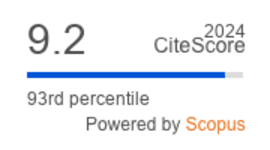Anti-Dengue Activity of Revaprazan Hydrochloride: A Repurposed Drug Candidate
DOI:
https://doi.org/10.36877/pmmb.a0000465Abstract
Dengue fever is a major health problem, and there are no vaccines or effective antiviral treatments. Drug repurposing is a quick and appealing innovative therapeutic strategy. This study aims to develop a potent anti-dengue drug for the treatment of dengue infections. In this study, we screened a library containing 174 compounds using foci-forming unit reduction and quantitative real-time polymerase chain reaction assays. Revaprazan hydrochloride showed the most potent anti-dengue activity and low cytotoxicity in Vero cells with a half-maximal inhibitory concentration (IC50) of 1.36 ± 0.16 µM, and a half-maximal cytotoxicity concentration (CC50) of 42.41 ± 0.05 µM. Revaprazan hydrochloride revealed 98.31% virucidal activity and 99.80% for post-infection activity against dengue virus serotype 3 (DENV-3). Revaprazan hydrochloride required only 5 min to exert its virucidal effects after contact with DENV-3. Time-of-drug addition and time-of-drug elimination assays indicated that revaprazan hydrochloride was able to interfere with the early stage of DENV-3 infection. In silico studies demonstrated that revaprazan hydrochloride had strong binding energy to the RNA-dependent RNA polymerase domain of the NS5 and the helicase domain of the NS2B/NS3 protein. DENV-3 showed no resistance up to 25 passages in the presence of revaprazan hydrochloride. Revaprazan hydrochloride showed varying inhibitory effects against all four dengue virus serotypes. Overall, revaprazan hydrochloride is a novel dengue virus inhibitor and could serve as a promising antiviral drug for further preclinical evaluations.
Downloads
Additional Files
Published
How to Cite
Issue
Section
License
Copyright (c) 2025 Shobana Gabriel, Malihe Masomian, Chit Laa Poh, Babu Ramanathan, Michelle Felicia Lee, Appalaraju Velaga, Md. Shamsur Rahman, Sheryar Afzal, Yuan Seng Wu

This work is licensed under a Creative Commons Attribution-NonCommercial 4.0 International License.
Author(s) shall retain the copyright of their work and grant the Journal/Publisher right for the first publication with the work simultaneously licensed under:
Creative Commons Attribution-NonCommercial 4.0 International (CC BY-NC 4.0). This license allows for the copying, distribution and transmission of the work, provided the correct attribution of the original creator is stated. Adaptation and remixing are also permitted.

This broad license intends to facilitate free access to, as well as the unrestricted reuse of, original works of all types for non-commercial purposes.
The author(s) permits HH Publisher to publish this article that has not been submitted elsewhere.



.png)

.jpg)
